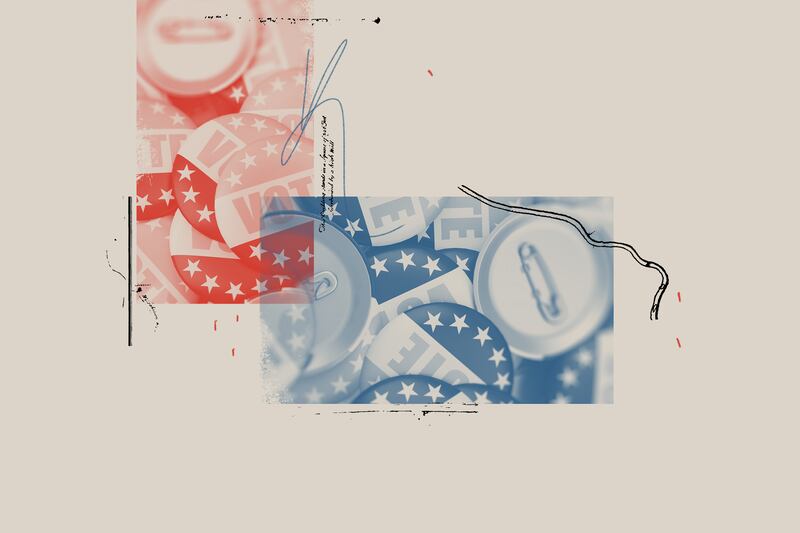A string of bad economic news may be reversing trends that seemed to be tilting voters toward Democrats in their quest to keep power in the House and Senate this fall. But it remains to be seen if Republicans can capitalize on voter dissatisfaction on the economy, given their own lack of a unified message.
The Democrats were gaining confidence in their chances of pulling out an unlikely win this November in the wake of the Supreme Court decision overturning Roe v. Wade, which invigorated Democratic activists and seemed to lift Democratic candidates in the polls. But the continuous drumbeat of bad economic news picked up again in the past few weeks, and polling shows Republicans have a clear advantage over Democrats in regards to who voters trust on the economy.
In the past week, voters were inundated with bad economic news. Grocery prices are up as inflation woes continue, home prices are falling, and the stock market just had one of its worst weeks in an already bad year, contributing to a record drop in U.S. household wealth.
In an interview with “60 Minutes” that aired over the weekend, President Joe Biden showed just how hard it is for Democrats to respond to criticism on economic issues. When asked about high inflation and grocery bills, Biden responded by downplaying the problem.
“Well, first of all, let’s put this in perspective,” he said. “(The) inflation rate, month-to-month is up just an inch. Hardly at all.” To which, correspondent Scott Pelley responded, “It’s the highest inflation rate, Mr. President, in 40 years.”
On the possibility of a recession, Biden said he would stave it off by “growing the economy.”
But economist Brian Riedl, a senior fellow at the Manhattan Institute, said a recession is still a “very real” possibility in the coming months, in part because of Democratic policies. Even as it became clear that inflation was a growing problem, he said, Democrats continued to pour money into the economy, both through their legislative agenda and through Biden’s executive actions, including his recent move to forgive billions of dollars in student loans.
“The more the president and Congress enact policies that will actually worsen inflation, the harder we’re going to need the Federal Reserve to push the brakes on inflation,” said Riedl.
As the Fed continues to raise interest rates to try to cool inflation, the more likely it is that the economy falls into recession, which could put Democrats at a disadvantage not just in this year’s midterms, but in the 2024 presidential election as well, Riedl continued.
But in order for Republicans to fully capitalize on runaway inflation, they would need to have their own economic agenda to run on, and so far their strategy seems to be to count on the bad economy sinking Democrats rather than coming up with their own solutions, he said.
Part of the problem is that the party’s base has shifted in recent years on economic issues, muddying the waters not just for voters but for elected officials as well. Riedl worked on a deficit reduction plan for Utah Sen. Mitt Romney’s 2012 presidential campaign, but the days of Republicans worrying about the deficit seem long gone, he said. Policies that may help fight inflation — like lower tariffs and reducing regulations — no longer seem to have popular support among Republican lawmakers or the base.
Despite their lack of a consensus on economic issues, keeping the economy at the forefront of voters’ minds would still seem to help Republicans. But the main issue keeping Republicans from focusing on the economy is abortion — and they have members of their own party to thank for keeping the issue front and center.
Many Republicans voiced frustration recently with Sen. Lindsey Graham, R-S.C., after he released a bill that would ban most abortions in the U.S. after 15 weeks. Democrats immediately seized on the bill, calling it a “national abortion ban.”
Graham’s bill is in line with international abortion laws, and more in line with where many U.S. voters say they are on the issue, but many in the party see the issue as a loser for them, and want to keep abortion out of the news altogether.
Some Republican candidates, like Senate candidate Blake Masters in Arizona, have tried to pivot on the issue of abortion by painting their Democratic opponents as extreme on the issue. Other Republicans just want the issue to go away. There are other concerns that are weighing on voters’s minds this year — like high crime and former President Donald Trump’s continued presence in the news — but inflation and the economy consistently rank as voters’ top concerns in polls.
With just a few weeks to go before early voting starts, it remains to be seen if Republicans can keep voters’ focus on the economy as they head to the polls, or if their lack of a unified message will keep them from winning in November.


